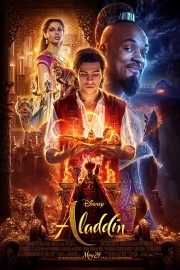Aladdin
In the first scene of Guy Ritchie’s “Aladdin,” a father is talking to his children, who are admiring a large, lavish boat from their smaller, more quaint one, about the dangers of wanting more than you have, and not being sucked in to the lures of wealth and power. That makes two films in a row, after Tim Burton’s “Dumbo,” where the makers of these Disney live-action “remakes” of the studio’s animated masterpieces have pointed out the very irony of the existence of the very films they’re making. I’m curious if the Mouse House will get the hint.
If you’ve seen the colorful and joyous 1992 animated film by Ron Clements and John Musker that Ritchie and screenwriter John August are adapting into the live-action realm, I do not need to explain the story, and even if you haven’t, you probably don’t need me to, anyway. I’m not interested in going over the story, but how successfully (or not) Ritchie and August bring it to another filmmaking medium. The results are not bad, but not worth the hundreds of millions of dollars it not doubt took Disney to make this film. There are parts of it that are fine, and some that are better than fine, but often, I found myself missing the joy the animated film told this story of a street rat who wishes himself a prince to court a princess with. Sometimes, it comes though; often, I felt more than a little bored. At least “Dumbo,” which was less successful, found a different way to tell its story, and pay tribute to the original.
I remember thinking that Guy Ritchie- he of the “Sherlock Holmes” films, “Snatch” and “Lock, Stock and Two Smoking Barrells”- was actually a pretty compelling choice to direct a live-action version of this story; at least, his staging and energy as a filmmaker would make the early scenes with Aladdin (Mena Massoud) on the streets, and the musical numbers, have a pulse to them. That’s not as true as I wanted it to be, but that’s partially because I’m not taken in by Massoud’s performance as Aladdin. He’s kind of a blank slate at the center of the film, and he doesn’t have quite the screen presence and confidence as his two, main screen partners, and, on the other side of the scale, the same is true with Marwan Kenzari as Jafar, although he’s hamstrung more because there’s no way a live-action performance could quite match up to the animation that brought Jafar to life in the original film. When your hero and villain don’t give you much to root, or hiss, at, your film is no doubt going to suffer, as a result.
Thankfully, Ritchie has two aces up his sleeve, and when they are on-screen, “Aladdin” finds some of its footing. The true MVP of the film is Naomi Scott as Jasmine, the Sultan’s daughter whom Aladdin first meets as she hides among her people on the street. She not only has the beauty to fulfill the role of a Disney “princess,” but the presence and feeling as a performer to make Jasmine feel completely formed as a character, so that when she confides in Aladdin or stands up to Jafar or breaks into a new song at a key moment we believe every second; this is a star-making role in a less-than-stellar movie, and whatever opportunities she finds herself getting after this will be richly deserved.
Finally, there is Will Smith as the Genie. Yes, the first shots of him in the role that came out were alarmingly cheesy, but Smith is fully-committed to the role, and more importantly, doesn’t try to go as big and broad with it as Robin Williams did in his all-time great voice work for the animated film. Will Smith stays within his wheelhouse, and he was a good choice for a live-action Genie. Smith has the mega-watt charisma to entertain in the smallest moments, and even if he cannot reach quite the comedic heights Williams did here, his natural showmanship is on full display, and helps Guy Ritchie’s film at least feel as though something was gained from its existence, besides a budding new female star in the making.










